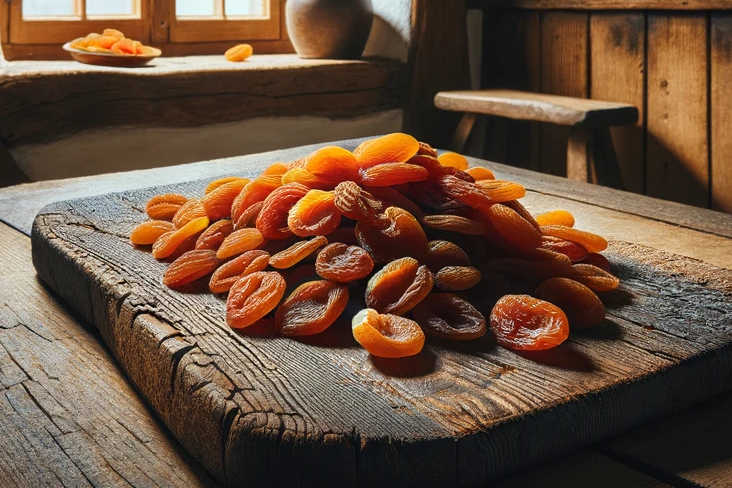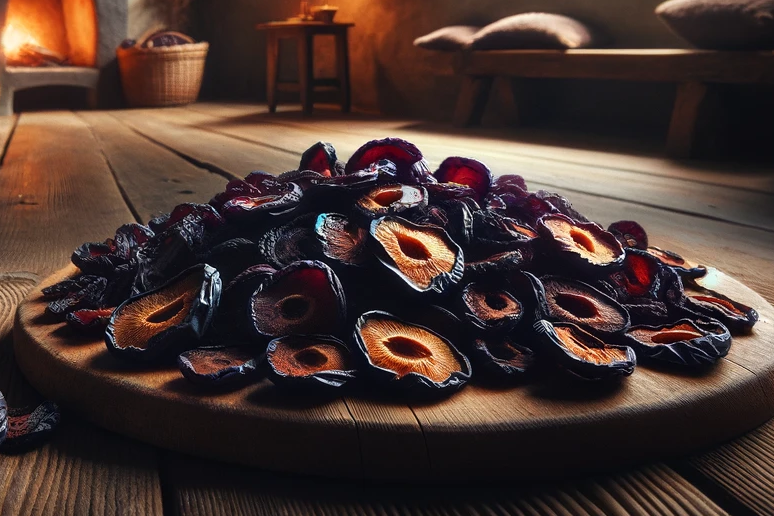Dried apples

What are dried apples?
Dried apples are nothing more than fresh apples that have been deprived of their water content through heat or dehydration. This makes them more durable, crispier and sweeter. Dried apples can be dried as whole fruits, in slices or in pieces. You can buy them in stores or make them yourself.
How are dried apples made?
There are various methods for drying apples. The most common are:
- In the oven: To do this, you need to wash the apples, core them and cut them into thin slices. Then place them on a baking tray lined with baking paper and sprinkle them with cinnamon to taste. Then place the tray in a preheated oven at 100°C and bake the apple slices for about an hour. Then turn them over and bake for another hour. Then leave the apple slices to cool in the oven.
- In the dehydrator: To do this, you also need to wash the apples, core them and cut them into thin slices. Then place them on the grids of the dehydrator and set the temperature to around 60°C. The drying time varies depending on the appliance and the type of apple, but you should check after about four hours to see if the apple slices are dry enough. You should still be able to bend them, but they should no longer be moist.
- In the air: This method is the easiest, but also the slowest. You also need to wash the apples, core them and cut them into thin slices. Then thread them onto a string or twine and hang them up in a dry, airy and sunny place. This could be a windowsill, a balcony or a garden, for example. The drying time depends on the weather, but you should allow at least a week.
What are the benefits of dried apples for dogs?
Dried apples have several benefits for dogs, both in terms of health and taste. Here are some of them:
- They are rich in vitamins and minerals: Dried apples contain many vitamins such as vitamin A, vitamin C, vitamin K and biotin, as well as minerals such as calcium, copper, manganese and sulphur. These nutrients support the health of your dog's skin, coat, eyes, immune system and blood clotting.
- They are rich in fiber: Dried apples are high in fiber, which aids your dog's digestion. Fiber stimulates intestinal movement and serves as food for the beneficial bacteria in the intestines. Fiber can also help regulate blood sugar levels and increase the feeling of satiety.
- They are rich in antioxidants: Dried apples contain many secondary plant substances such as flavonoids, which have an antioxidant effect. Antioxidants protect your dog's cells from free radicals caused by environmental factors or metabolic processes. Free radicals can lead to cell damage, inflammation and ageing processes. Antioxidants can therefore reduce the risk of chronic diseases such as cancer, cardiovascular disease and arthritis.
- They are tasty and crunchy: Dried apples have a sweet and fruity taste that many dogs like. They also have a crunchy texture that stimulates chewing and helps to clean teeth. Dried apples can therefore be a good snack between meals or a reward during training.
What are the disadvantages of dried apples for dogs?
Dried apples also have some disadvantages for dogs that you should be aware of. Here are some of them:
- They are high in calories: dried apples have a higher calorie content than fresh apples because they are more concentrated. One cup of dried apple pieces has about 210 calories, while one cup of fresh apple pieces has only about 65 calories. Giving your dog too many dried apples can lead to overweight and obesity, which in turn increases the risk of diabetes, joint problems or cardiovascular disease.
- They are high in sugar: Dried apples also have a higher sugar content than fresh apples as they contain less water. One cup of dried apple pieces has about 50 grams of sugar, while one cup of fresh apple pieces has only about 13 grams of sugar. Giving your dog too much sugar can lead to tooth decay, tartar or gingivitis. Sugar can also raise your dog's blood sugar levels and contribute to diabetes or other metabolic disorders.
- They may contain additives: If you buy dried apples in the shops, you should always check the ingredients list. Some products contain additives such as sugar, honey, syrup, preservatives or flavorings that can be harmful to your dog. For example, xylitol, an artificial sweetener, can be fatal for dogs. Additives can also trigger allergies or intolerances or alter the taste and nutritional value of dried apples.
How can you feed your dog dried apples?
If you want to feed your dog dried apples, you should follow a few tips:
- Choose high-quality products: It's best if you make your own dried apples or buy ones that contain no additives. Make sure that the apples are ripe, clean and undamaged. It is best to use organic apples or wash the skin thoroughly.
- Feed in moderation: Dried apples should only be used as an occasional snack or treat and should not make up more than 10% of your dog's daily calorie intake. The exact amount will depend on your dog's size, age and activity level, but as a guideline you can assume about one slice per day for small dogs and two to three slices per day for large dogs.
- Remove the skin: You should always remove the skin from dried apples before giving them to your dog. The casing contains seeds or pips, which contain hydrocyanic acid and are poisonous to your dog. The casing can also be a choking hazard or block the intestines
Dried apples are fresh apples from which water has been removed, making them longer-lasting, crispier and sweeter. They can be purchased commercially or made yourself, with the most common methods being drying in the oven, in a dehydrator or in the air.
For dogs, dried apples offer health benefits such as high levels of vitamins, minerals, fiber and antioxidants. They are also a tasty, crunchy snack. However, they can also have disadvantages, such as a high calorie and sugar content and potentially harmful additives in commercial products.
When feeding dried apples to dogs, it is important to choose high-quality products without additives, feed them in moderation and remove the casing to avoid risks such as hydrogen cyanide poisoning, choking or intestinal blockage.
If you notice any signs of hypersensitivity or poisoning in your dog, you should see your vet immediately. We are not a substitute for a vet, but we try to be as accurate as possible. Every dog reacts differently and we recommend you get a second opinion or consult your vet if in doubt.
Stay healthy and take good care of your four-legged friend!😊
Similar to Dried apples
Dried apricots are the result of the drying process of fresh apricots. This process significantly reduces the water content of the fruit, giving it a longer shelf life while concentrating its...
Dried plums, also known as prunes, are the result of the drying process of fresh plums. This process reduces the water content of the fruit, concentrating its natural sugars and nutrients. The...
Dried pears are the result of a dehydration process in which water is removed from fresh pears, either through natural sunlight or with the help of food dehydrators. This process preserves the fruit...
Dried strawberries are made by removing the water content from fresh strawberries, either by air-drying, using a dehydrator or baking. This process preserves the fruit while concentrating its...



